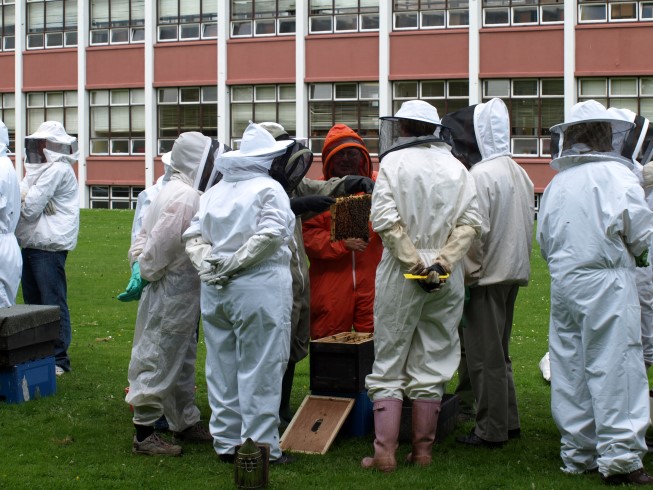An international panel of scientists including Professor Lin Field from Rothamsted Research is calling for an evidence-driven debate over whether a widely used type of insecticide is to blame for declines in bees and other insect pollinators.
An EU ban on certain neonicotinoid insecticides was introduced in December 2013 because of fears they are harming pollinating insects. Pollination by insects is critical for many crops and for wild plants but at the same time neonicotinoids are one of the most effective insecticides used by farmers. Potential tensions amongst the agricultural and environmental consequences of neonicotinoid use have made this topic one of the most controversial involving science and policy.
A restatement of the scientific evidence on neonicotinoids has been published in the Proceedings of the Royal Society. The restatement, from a group of nine scientists led by Professor Charles Godfray and Professor Angela McLean of the Oxford Martin School at Oxford University, clarifies the scientific evidence available on neonicotinoids, to enable different stakeholders to develop coherent policy and practice recommendations.
One of the authors Professor Lin Field from Rothamsted Research said:
“It was a pleasure to work with my co-authors who all have diverse expertises, relevant to the debate over the potential effects of neonicotinoids on pollinators, but all wanted to look at evidence rather than opinion. It is essential that we base decisions in this important area on science, so that we find the best way forward to ensure both pollinator success and good crop protection strategies for food production.”
Professor Charles Godfray said:“Pollinators are clearly exposed to neonicotinoid insecticides, but seldom to lethal doses, and we need a better understanding of the consequences of realistic sub-lethal doses to the insect individual, bee colony and pollinator population.”
Professor Angela McLean added:“A major question to be addressed is what farmers will do now that they face restrictions on the use of neonicotinoids. Will they switch to crops that need less insecticide treatment or might they apply older but more dangerous chemicals?”
The restatement describes how much insecticide is present in a treated plant and how much is consumed by pollinators. It goes on to summarise how neonicotinoids affect individual bees and other pollinators, and the consequences at the colony and population levels.
In reaction to this study, Professor Ian Boyd, Chief Scientific Advisor at Defra said:“It is essential that policies on the use of pesticides are built on sound scientific evidence. This paper provides an independent assessment of this subject which will provide clarity and authority in order to help people make more informed choices.”
